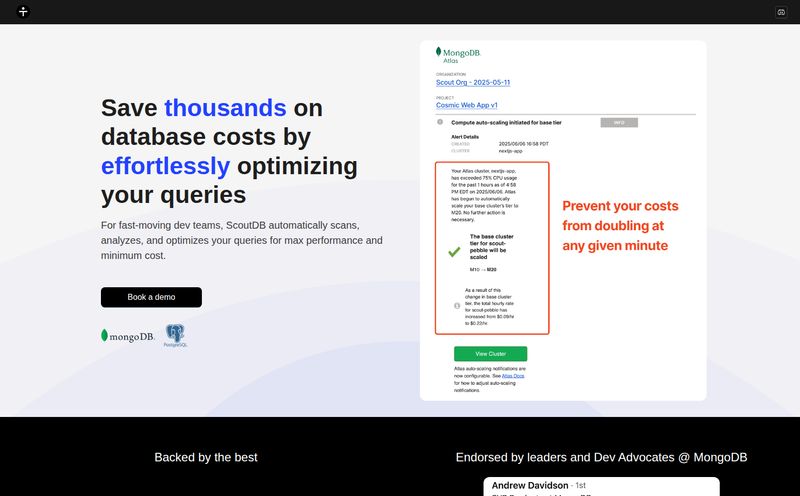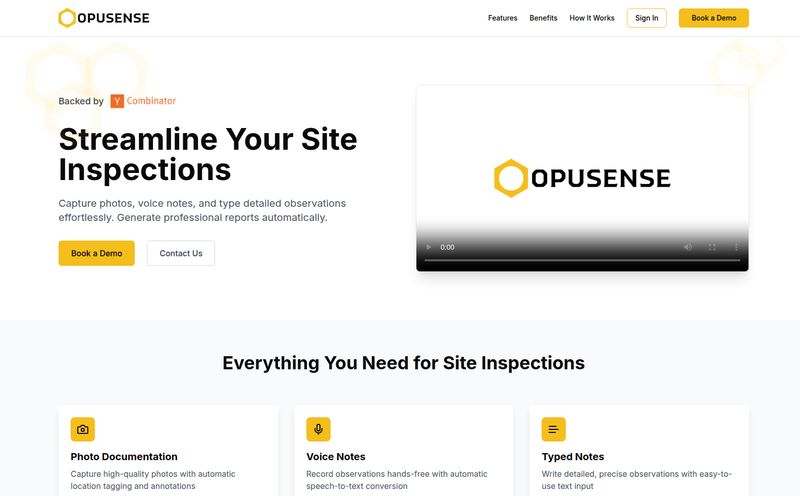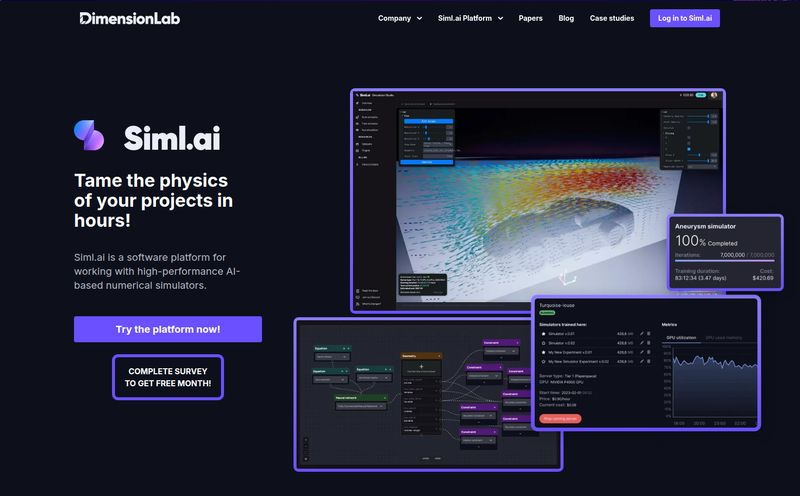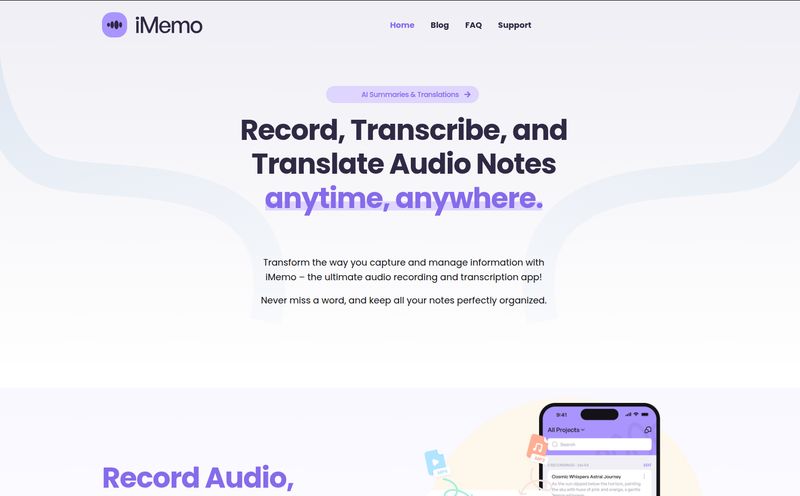Writing release notes is a chore. It's that tedious, end-of-sprint task that somehow falls through the cracks until the very last minute, forcing some poor soul to scroll through an endless git log trying to decipher what “fixed the thing” actually means. We’ve all been there. It’s a pain for developers, and an even bigger headache for the project managers who have to translate that mess into something a customer can understand.
For years, I've preached that a project's commit history is its autobiography. If you treat it with respect, it tells a rich story of growth, challenges, and collaboration. But most teams... well, they treat it like a pile of scrap paper. So when a tool called DigestDiff slid across my desk promising to be an AI historian for my code, I was skeptical but intrigued. Another AI wrapper? Maybe. But this one had a twist that genuinely caught my attention.
It doesn't read your code. At all.
So, What Exactly is DigestDiff?
Think of DigestDiff as a clever interpreter that focuses solely on your `git` commit history. It's built on a simple yet powerful premise: the messages you and your team leave behind with every commit contain a narrative. A story of progress. DigestDiff uses AI to read that story and summarize it for you in useful ways.
It’s not a code analysis tool, it's not a security scanner, and it’s not another Copilot trying to write code for you. It’s more like a project archaeologist, dusting off the artifacts (your commits) to piece together a timeline of what actually happened on a project. And frankly, in a world where every AI tool wants to slurp up your entire codebase, this privacy-first approach is a massive breath of fresh air.
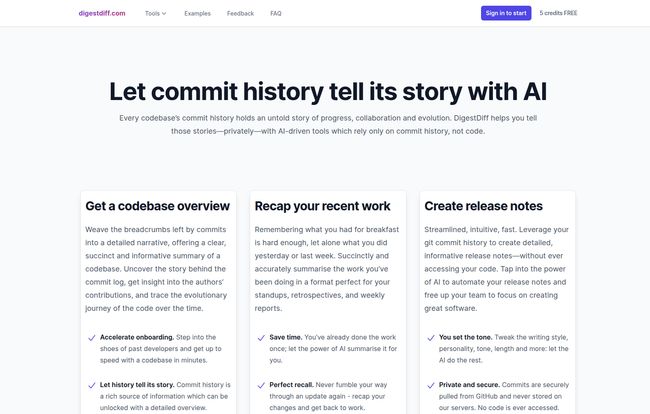
Visit DigestDiff
The Features That Actually Move the Needle
Okay, so it reads commits. Cool. But what does it do with them? The platform breaks it down into a few core functions that target some very real, very common developer pain points.
Automated Release Notes That Don’t Suck
This is the headline feature for me. The idea of feeding a commit range to an AI and getting back a coherent, well-written draft for your release notes is… well, it’s the dream, isn’t it? DigestDiff pulls the relevant commits and spins them into a narrative. What’s really neat is the ability to set the tone. You can ask for something formal for your enterprise clients, or a more casual, witty update for your community on Discord. It's all exportable to Markdown, so it slots right into your existing workflow. A huge time-saver.
Codebase Overviews for Onboarding
Ever joined a new project and been handed a codebase with zero documentation? Of course you have. It's a rite of passage. DigestDiff offers a feature to generate a high-level overview of a repository based on its entire commit history. This is an absolute godsend for new developers. Instead of spending two weeks just trying to figure out where things are, they can get a summary of the project's entire evolution—major features added, significant refactors, the works. It helps them get up to speed on the why behind the code, not just the what.
Instant Standup Updates
“So… what did you work on yesterday?” The dreaded question. Some days you have a clear answer. Other days, you've been so deep in the weeds that you can barely remember your own name. This feature gives you a quick recap of your recent commits, perfectly summarized for a daily standup or a weekly report. It’s a small thing, but those five minutes saved every single day add up.
Let's Talk About Privacy, Because We Have To
This is where DigestDiff really stands out from the crowd of AI tools. Their privacy policy isn't buried in a 40-page legal document; it's the main event. They state it loud and clear on their homepage: "We will never access any code. Ever."
They only request read-only access to your commit history. The AI does its thing, generates the text, and that's it. They don't store your code, they dont store the generated notes, nothing. For any company with proprietary software, this is a non-negotiable feature. The fact that DigestDiff leads with this shows they understand their audience. They get that developers and businesses are rightly paranoid about handing over their intellectual property to a black box AI.
My Honest Take: The Good, The Bad, and The Git Blame
Alright, no tool is perfect. After playing around with my free credits, here's my unfiltered take.
The good stuff is obvious. The time-saving on administrative tasks like release notes and reports is a clear win. The onboarding potential is huge, and I can see it drastically reducing the ramp-up time for new hires. And that privacy-first model? Chef's kiss. It builds a level of trust that is sorely lacking in the AI space right now.
However, there are a few catches. The biggest one is the 'Garbage In, Garbage Out' problem. The quality of DigestDiff's output is 100% dependent on the quality of your commit messages. If your team’s `git log` is full of gems like `"fix"`, `"wip"`, and `"stuff"`, then this tool will be completely useless to you. It's a harsh truth, but it forces a good practice. To get the most out of it, your team needs to adopt a standard, like the Conventional Commits specification. This isn't necessarily a con, but it's a prerequisite you need to be aware of.
It also seems to be pretty tightly integrated with GitHub. For teams on GitLab, Bitbucket, or a self-hosted solution, you might be out of luck for now, though you can manually paste in a git log. Finally, the free credits are great for a test drive, but you’ll burn through them pretty quickly if you start using it for daily standups across a whole team.
What's the Damage? A Look at DigestDiff's Pricing
This is where things get a little mysterious. As of writing this, there's no public pricing page (I actually hit a 404 page trying to find it, which is oddly charming). What we do know is that you can get started for free. You get 5 free credits when you sign up, which is enough to generate a few release notes or a codebase overview to see if it fits your workflow.
Beyond that, it's likely they'll move to a model based on credit packs or a monthly subscription per user or repository. I'd expect something reasonable, aimed at small to mid-sized teams where the time saved for a dev lead or PM easily justifies teh cost. But for now, you can try before you buy, which is always a plus in my book.
So, Who Is This Tool Really For?
Is DigestDiff for everyone? Probably not. If you're a solo dev working on a personal project, it's likely overkill. If your team's commit discipline is, shall we say, creative, you need to fix that first.
But for a dev lead, a project manager, or any team that already values good `git` hygiene, this tool could be a low-key superpower. It's for teams that need to communicate progress upwards to management or outwards to customers. It’s for open-source projects that need to generate regular changelogs. It's for any organization that wants to streamline onboarding and preserve its institutional knowledge. For those folks, DigestDiff isn't just a novelty; it's a genuine productivity multiplier.
A Story Worth Telling
In the end, DigestDiff is a fascinating take on AI in the dev space. Instead of trying to replace the developer, it aims to empower them by taking on the tedious, thankless tasks that get in the way of actual coding. It encourages better habits and turns your commit history from a messy audit trail into a valuable, queryable asset.
It won't fix a broken workflow, but if you have your processes in order, it can add a layer of automation and insight that feels genuinely useful. It's a tool that respects your code, your privacy, and your time. And in 2024, that’s a story worth telling.
Frequently Asked Questions
1. Does DigestDiff read or access my source code?
Absolutely not. This is their main selling point. The tool only requests read-only access to your commit history (the messages, author, dates, etc.). Your actual code is never touched, seen, or stored.
2. What happens if my team writes bad commit messages?
The output will likely be poor. The tool's effectiveness is directly tied to the clarity and detail of your commit messages. To get the best results, it's recommended to follow a convention like Conventional Commits.
3. How much does DigestDiff cost?
Currently, there is no public pricing page. However, you can start for free with 5 credits to test all the features. Paid plans will likely be available in the future.
4. Can I use DigestDiff with GitLab or Bitbucket?
The primary integration is with GitHub. While there isn't a direct integration for other platforms yet, you can manually copy and paste a `git log` output into the tool to use its features.
5. What can I do with the 5 free credits?
Each major action, like generating a set of release notes or a full codebase overview, consumes a credit. Five credits are enough to get a solid feel for the tool's capabilities on one or two of your own repositories.
6. Is DigestDiff just a simple wrapper around a large language model?
While it uses AI, it's more than just a simple prompt. It involves parsing the git history, understanding commit ranges, and structuring the output specifically for developer-centric tasks like release notes and technical summaries. The privacy-first architecture also distinguishes it from generic AI tools.
